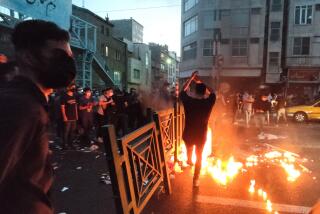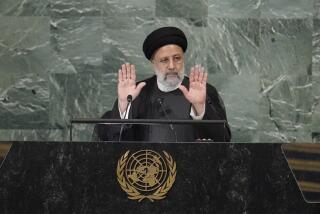Well-Timed Step Toward Iran
- Share via
The people whose judgments count most in Iran haven’t rushed to embrace Secretary of State Madeleine Albright’s offer to seek better relations, but neither have they rejected it. In their Iranian new year’s messages this week, both Ayatollah Ali Khamenei, the conservative supreme religious leader, and moderate President Mohammad Khatami simply ignored the American initiative. Iran’s U.N. envoy, considerably lower in the chain of command, found the U.S. proposal “important and refreshing,” but--covering all the bases--he also condemned the Clinton administration’s “insolent and domineering spirit.” Take all this to mean that Tehran may eventually be ready to open a dialogue with Washington, but not until Khatami and the reformers who will take control of parliament in May feel secure enough to explore a fresh relationship after decades of hostility.
The coolness of the Iranian response doesn’t diminish the significance of the American gesture. The United States has now lifted its ban on imports of such Iranian luxury goods as carpets and caviar. At the same time, Albright took the symbolically important step of expressing regret for some earlier U.S. actions, including support for Iraq in the bitter war it fought with Iran in the 1980s and--reaching far back--the part Washington took in ousting populist revolutionary leader Mohammed Mossadegh and restoring the exiled Shah Reza Pahlavi to his throne in 1953. But the U.S. position on some important policy demands, including an end to Tehran’s support for international terrorism and its development of long-range missiles, remains unchanged.
The timing of the U.S. approach was determined by the political shift that started with Khatami’s sweeping and unexpected electoral triumph three years ago. Last month’s parliamentary elections underscored the eagerness of most Iranians for a freer and more tolerant society. To be sure, conservative clerics retain ultimate authority in many key areas, including foreign policy. But by taking the first step toward conciliation, by holding out the prospect of eventual expanded trade to benefit Iran’s sagging economy, Washington is trying to show that moderation encourages rewards. This was the necessary and welcome launching of a political process. What happens next will be decided in Tehran.
More to Read
Sign up for Essential California
The most important California stories and recommendations in your inbox every morning.
You may occasionally receive promotional content from the Los Angeles Times.









